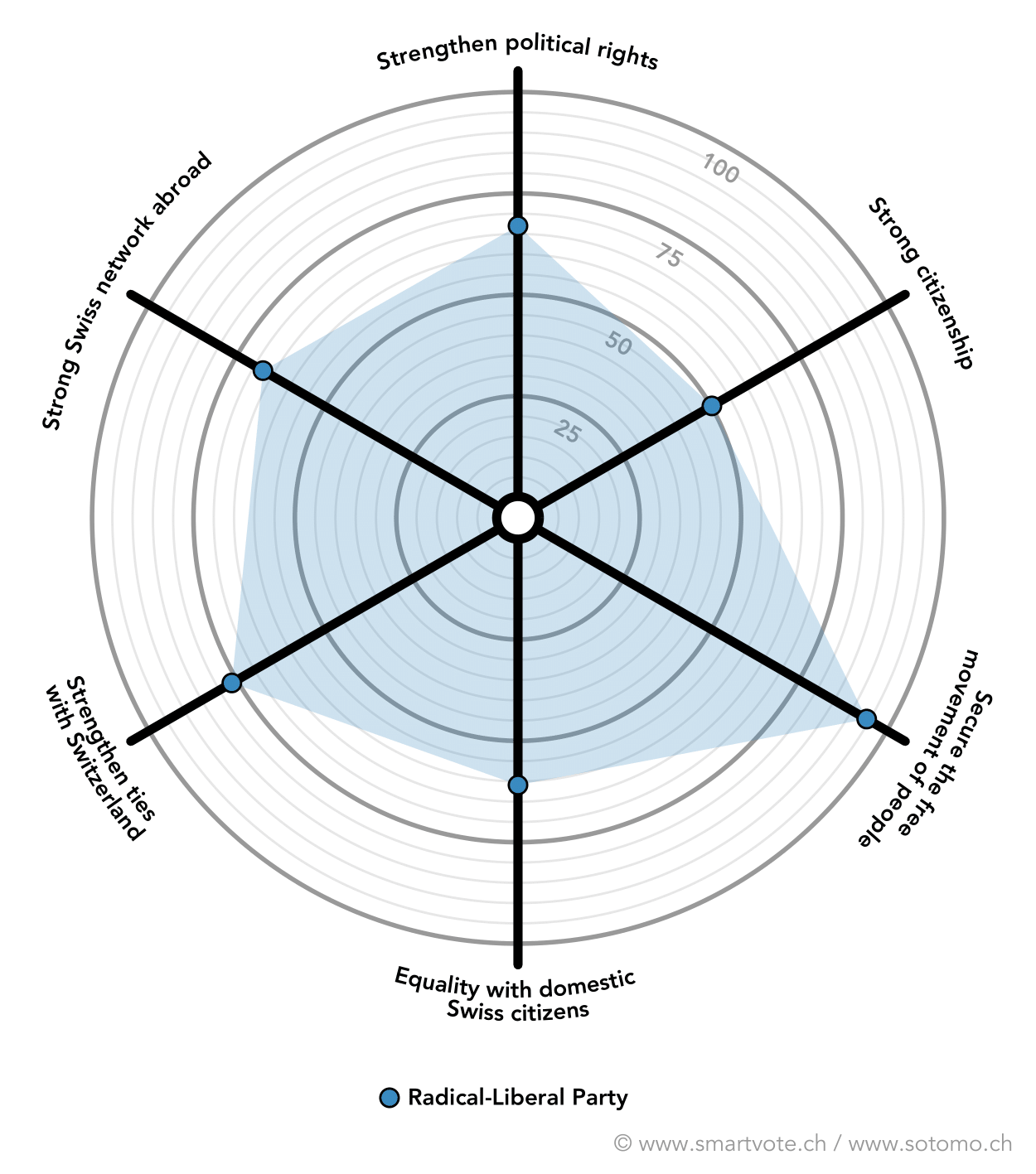
Radical-Liberals International: a youthful friend of the Swiss Abroad

The centre-right Radical-Liberal Party has been committed to the Swiss Abroad through their international section for over 30 years. Although the party believes that having a Swiss bank account is not a fundamental right for citizens abroad, it is campaigning for a solution to this issue.
Last year, the international section of the Radical-Liberals celebrated its 30th anniversary. It was founded in 1992 after a new law was passed to allow citizens living abroad to engage in Swiss politics.
“At that time, the Radical-Liberal Party told itself that if the Swiss Abroad can already vote and elect [members of parliament], then they must also be well informed,” says Helen Freiermuth, president of Radical-Liberals International. The section currently has 200 members in over 30 countries. “And we are growing,” says Freiermuth, who has lived in Turkey for ten years.
- The Radical-Liberal Party
- Year founded: 1894 (Officially, the Radical Party was founded as a nationwide umbrella organisation in 1894. However, free-radical and free-liberal associations already existed in most cantons. The first federal ministers also identified with this political movement)
- Mergers: In 2009, the Radicals merged with the Liberal Party of Switzerland. Since then, the official party name has been Radical-Liberals
- President: Thierry Burkart (senator from canton Aargau)
- 2 seats on the Federal Council (the executive body): Karin Keller-Sutter (since 2019) and Ignazio Cassis (since 2017)
- Number of members: approx. 120,000 members (incl. registered supporters)
- Share of seats in parliament: 16.7%
- 29 parliamentarians in the House of Representatives
- 12 senators
- Proportion of women in parliament: 29%
- Political positioning – three core concerns:
- For a free and competitive Swiss economy that is not hampered by too many regulations.
- For secure and sustainably financed social security systems so that future generations can still draw pensions.
- For a secure Switzerland that must increase its military capabilities itself and at the same time, as far as neutrality allows, seeks cooperation with other countries. (SRF)
The international section defines three “main tasks” for itself. The first is to inform the Swiss Abroad of political developments in Switzerland. The second is to bring the outside view of citizens abroad into the country, “because Swiss people abroad can still bring a somewhat different perspective”, says Freiermuth.
The third task, as the president sees it, amounts to what the Organisation for the Swiss Aboard itself aims to do, and that is to search for solutions to make life abroad a little easier.
Wishful thinking on direct representation
For many Swiss Abroad, direct representation of the kind that exists in Italy or France remains a pipe dream. Freiermuth herself has run for parliament in the canton of Zurich “in a hopeless position”, as she puts it. Clearly the obstacle lies in citizens abroad not having their own constituency, which itself remains “a distant goal”.
For this reason, the Radical-Liberals do not have their own list of Swiss Abroad candidates, and instead promote indirect representation in parliament. “With our international section, we sensitise parliamentarians to issues that affect Swiss citizens abroad,” says Freiermuth. The section can also recommend candidates who will fight for the Swiss Abroad.

The main concerns
The international section has adopted an election manifestoExternal link for the autumn elections in which it defines its priorities and demands. Among these are a policy that treats the Swiss Abroad as equal citizens, sustainable relations between Switzerland and the European Union, and support for the work of the Radical-Liberals.
To achieve equal treatment for the Swiss Abroad, the party is committed to digitalisation and e-voting. “In this context, the introduction of the e-ID is the basis for both,” says Freiermuth.
Because a large proportion of the Swiss Abroad live in Europe, the international section also has high hopes for a resumption of negotiations between the EU and Switzerland on a framework agreement. “But it takes two sides to negotiate, and both sides will have to make concessions in order to move forward and make [Switzerland’s participation in] international programmes such as Horizon Europe possible again,” says Freiermuth.
A ‘protracted story’ about e-voting
Freiermuth has been on the board of Radical-Liberals International for 16 years. “E-voting has been an issue since my first meeting,” she says. The party has always demanded that such a system be introduced – “an up-and-down, protracted story”, as Freiermuth calls it. “Now I think we can see a light on the horizon again.”
The version of an e-voting system presented last spring is only a first step. It will also be necessary to find a way to send the codes needed for postal e-voting electronically. “And that is why the e-ID is so important for the Radical-Liberals’ international section,” says Freiermuth.
Health insurance a recurring topic
For the Swiss Abroad, health insurance is a difficult issue. “But one’s hands are often tied, also because of bilateral agreements,” says Freiermuth. And these accords cannot simply be circumvented. The issue of social insurance is complex, with many factors, such as the country of residence and whether a person is employed or retired, coming into play.
“In many countries it is really difficult to get a reasonable health insurance scheme,” Freiermuth explains, citing Thailand as an example. The Radical-Liberals International believes that it should be possible to make the Swiss Abroad an offer in such situations. “But we are ‘Radical-Liberal’ enough to know that we cannot oblige the health insurers to do so,” she says, adding that the party is nevertheless continually looking for solutions.
No right to a Swiss bank account
For years the Swiss Abroad have claimed that they are discriminated against when it comes to banking.
“Thanks in part to the Organisation of the Swiss Abroad, there are now solutions for Swiss people abroad,” says Freiermuth. But it is still difficult for some to obtain a Swiss bank account. The Radical-Liberals have repeatedly advocatedExternal link in parliament for bank account access for citizens abroad.
“But there is no right to a Swiss bank account if you are Swiss,” says Freiermuth, especially not under the same conditions. “There are simply other requirements.” However, the section president is convinced that bank fees should be set within reasonable limits.
+ Pensions policy: After nearly 30 years of trying, a reform of the old-age and disability pension scheme was finally agreed. The retirement age for women will now be the same as for men. The Radical-Liberals helped to shape this reform and strongly supported it. They also played a decisive role in parliament in the reform of the pension fund (although a referendum on this is pending).
+ Strong leadership in government : The Radical-Liberal Party has a federal minister – Karin Keller-Sutter – who is both influential on the Federal Council and popular with the public. After a few years heading the Federal Department of Justice and Police, she now heads a key department, finance, and has already distinguished herself in this function as a crisis manager. (SRF)
– Tax policy: The party had to accept bitter defeats in recent referendums on tax policy, a key issue for the Radical-Liberals. Left-leaning parties were successful in getting voters to say no to the abolition of stamp duty and the partial abolition of withholding tax. Here the Radical-Liberals lost out.
– Zurich elections: The election results in the canton of Zurich, an important constituency for the Radical-Liberals, were disappointing. Contrary to expectations, the party stagnated and could not make up for losses it had suffered four years earlier. Nor did they succeed in winning a second seat in the cantonal government. (SRF)
Election issues and goals
Strengthening the economy and preserving jobs: With more digitalisation and less bureaucracy, the Radical-Liberals are looking to fight to make Switzerland a more dynamic business location. Research should be promoted with as few prohibitions as possible. And to promote women’s participation in the labour market, the party is calling for the introduction of individual taxation.
Making old-age pension schemes fit for the future: The Radical-Liberal Party is committed to the three-pillar pension model, including an independent private pension provision. The party wants a more flexible retirement age and therefore supports the pension initiative of the Young Liberals.
Building a secure Switzerland: The party wants security policy to be given greater priority once more. Capability and equipment gaps in the Swiss army should be remedied and the necessary funds made available for this purpose. According to the Radical-Liberals, Switzerland should seek closer cooperation with NATO – but without joining the alliance. (SRF)
Starting position and prognosis
This year, the Radical-Liberal Party took a tumble in cantonal elections, even losing some of its vote share. The spirit of optimism and euphoria that prevailed in liberal circles at the beginning of the year has therefore faded somewhat.
The party, however, is sticking to its election goal and wants to become the second-strongest party by overtaking the Social Democrats. The party’s leaders are aware that this will be difficult to achieve. But they are fighting hard and emphasise that they have to face difficult challenges.
The worst-case scenario for the Radical-Liberals would be if they not only missed their election target, but was also overtaken by The Centre as the third-strongest party in the land. (Elmar Plozza, SRF)
Edited by Marc Leutenegger. Translated from German by Sue Broennimann

In compliance with the JTI standards
More: SWI swissinfo.ch certified by the Journalism Trust Initiative



























You can find an overview of ongoing debates with our journalists here . Please join us!
If you want to start a conversation about a topic raised in this article or want to report factual errors, email us at english@swissinfo.ch.